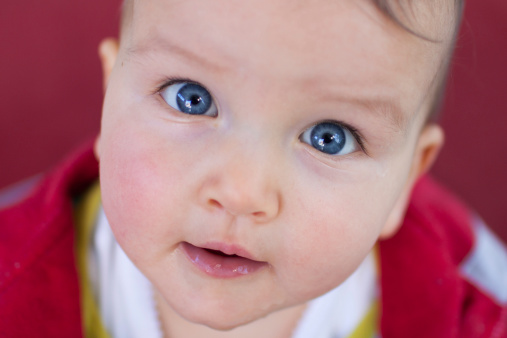Comments such as “the girls don’t stand a chance” or “the ladies better look out” about my 8-month-old son make me feel incredibly uncomfortable.
If I had a dime for every time a person, often a stranger, said something to the effect of “the girls don’t stand a chance with those eyes” about my son, I wouldn’t be rich just yet, but the coins would certainly be adding up.
My son is almost 8 months old and has, in my biased opinion, the most incredible blue eyes. And it seems that others think so too because my husband and I hear it everywhere we go.
I’m always flattered by the compliment given to our son and say “thank you.” I often see people glance to my eyes (or my husband’s if we are all three together) to determine which one of us shares the same beautiful eye color. We don’t—we both have brown eyes. I don’t think I’ve ever been complimented on my eye color, or at least not with the consistency and to the extent that my son has in his life thus far.
Sometimes there is a follow-up question: “Does his daddy have blue eyes?” or “Where does he get those eyes?” My husband and I adopted our son at birth. His birth father has blue eyes. So, yes, he did get his eye color from his daddy, or maybe from his birth mother since blue eyes also run in her family. If I feel up for a longer conversation about adoption, I will explain this to the stranger, but other times I just want to check out of the grocery store and head home.
When our son can developmentally understand that he is adopted, he will have the choice of how he wants us to respond to such questions, or he can chose to do so himself. We are open about our son’s adoption, but we firmly believe that it is up to him to determine when, where, and how to share our specific family story.
My point in raising the commentary surrounding my son’s eye color has less to do with adoption and how people feel compelled to make sense of our family, but more to do with people making assumptions that our son is heterosexual. Comments such as “the girls don’t stand a chance” or “the ladies better look out” make me feel incredibly uncomfortable. Not only is it odd to be discussing my 8-month-old son’s future romantic interests, but I know I should say something about the heterosexist assumptions being made about my son’s sexual identity.
While I have said something a few times, I don’t always. I’ve justified my behavior (or lack thereof) by telling myself that my son is too young to understand or that the park or grocery store isn’t the place to question someone’s heterosexist comments. I am embarrassed and disappointed in myself that I have allowed numerous people to make such assumptions about my son.
Challenging stereotypes is often uncomfortable and messy. As an educator, and one who focuses on cultural diversity, I know better. Researcher Elizabeth Peel referred to everyday or subtle examples of heterosexism as mundane heterosexism whereby the heterosexism often goes unnoticed because it has become socially normative.
Regardless of its subtlety, I know that challenging such commentary is important. Heterosexism includes the presumption that people are heterosexual or that opposite-sex attractions and relationships are the norm and therefore superior. By not saying something, I am suggesting—to the stranger and to my son (and anyone in earshot)—that individuals who identify as lesbian, gay, bisexual, or transgender are non-existent and that their sexual identity is not valid or legitimate.
My son might identify as heterosexual, but he also might identify as gay, bisexual, or transgender. I don’t know and neither does the stranger making her or his assumptions.
My son’s sexual identity is what it is. And regardless of how my son identifies, I want him to also learn that what that stranger, neighbor, teacher, coach, or friend is saying is stereotypical and heterosexist and that sometimes boys like girls, sometimes boys like boys, or girls like girls and that it is important to acknowledge all forms of love.
As a parent, I also want him to know that it is important to speak out and stand up for your beliefs and values, even when it is uncomfortable. This was an important parenting lesson for me.
Emily Roper, PhD is an Associate Professor in the Department of Kinesiology at Sam Houston State University. Her research focuses on gender and identity in sport and physical activity.
Related Links:

